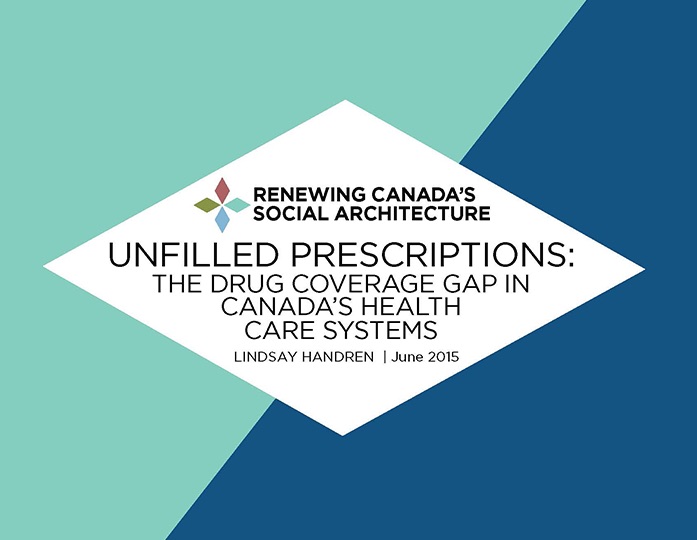Unfilled Prescriptions: The Drug Coverage Gap in Canada’s Health Care System, a report by the Mowat Centre, says that universal pharmacare and other strategies could save Canada up to $14 billion a year.
The National Post reports, “Canadians who can’t afford their prescriptions add between $7 and $9 billion in costs to the health care system, a new report states. …Many don’t fill prescriptions because they can’t afford to, a phenomena exacerbated by the patchwork of coverage in different provinces. Those who can’t or won’t fill their prescriptions end up back in hospital and the phenomena leads to ‘higher mortality’…If universal coverage were combined with other strategies, the Mowat report estimates national pharmacare could save Canadians and their governments a combined $14 billion a year.”
The report says that universal pharmacare alone would save up to $11.4 billion a year.
The article highlights, “We spend more annually on prescription drugs than doctors, the report notes. Only hospitals eat up more health-care cash, and yet drugs are not universally or even consistently covered across the country. Spending on pharmaceuticals, which includes government-funded drugs such as chemotherapy and out-of-pocket or insured costs like birth control, hit $27.7 billion in 2012. In 1985, Canada spent about $2.6 billion on pharmaceuticals (about $6 billion in 2012 dollars). …In 1985, the average Canadian spent less than $100 a year on drugs. In 2012, it neared $800.”
In March, health policy researchers stated in the Canadian Medical Association Journal that a universal drug plan could reduce total spending on medications in Canada by $7.3 billion a year and provide coverage to everyone with the total extra cost to government in the range of $1 billion to $5.4 billion.
While universal pharmacare makes sense, the Canada-European Union Comprehensive Economic and Trade Agreement (CETA) does not.
Council of Canadians health-care campaigner Michael Butler has noted, “It is estimated that changes to patent protection for pharmaceutical drugs in CETA could end up costing our public health care system anywhere between $850 million to $1.65 billion annually. This is up to 13 per cent of the total drug costs Canadians pay annually.”
He argues, “If CETA is ratified the likelihood of a national pharmacare plan becomes substantially more difficult (if possible at all) as we would also face billions of dollars in lawsuits under the investor-state dispute settlement (ISDS) mechanism. Pharmaceutical corporations that see pharmacare as an infringement on their right to profit from life-saving medications would be well positioned with this provision to stop such an initiative. The recent $500 million ISDS lawsuit under NAFTA against Canada by U.S. pharmaceutical giant Eli Lilly highlights the difficulty of making cheaper generic drugs available to Canadians.”
Butler concludes, “If we want to implement universal pharmacare, then we must say no to ‘free trade’ deals like CETA.”
And then there’s Harper’s funding formula for health care.
CBC has reported, “The federal government has guaranteed the provinces an annual 6-per-cent increase in health care funding until 2016-17. After that, increases will be tied to growth in nominal gross domestic product, a measure of GDP plus inflation — but is guaranteed to be at least 3 per cent.” This would amount to a $36-billion cut in total health funding to the provinces over 10 years.
For more on our health-care campaign, please click here.



